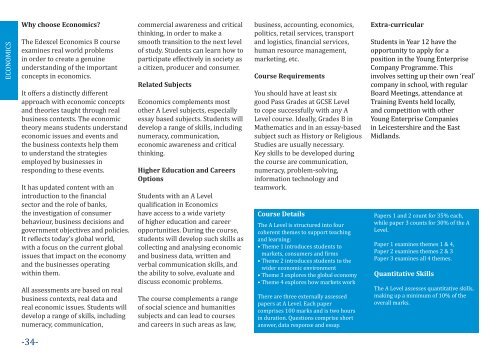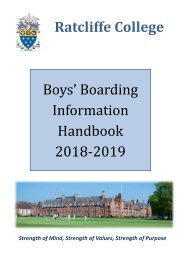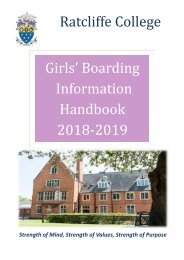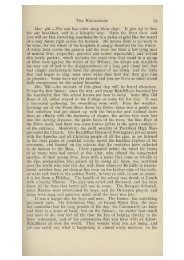Ratcliffe College - Sixth Form Handbook
Ratcliffe College - Sixth Form Handbook
Ratcliffe College - Sixth Form Handbook
You also want an ePaper? Increase the reach of your titles
YUMPU automatically turns print PDFs into web optimized ePapers that Google loves.
ECONOMICS<br />
Why choose Economics?<br />
The Edexcel Economics B course<br />
examines real world problems<br />
in order to create a genuine<br />
understanding of the important<br />
concepts in economics.<br />
It offers a distinctly different<br />
approach with economic concepts<br />
and theories taught through real<br />
business contexts. The economic<br />
theory means students understand<br />
economic issues and events and<br />
the business contexts help them<br />
to understand the strategies<br />
employed by businesses in<br />
responding to these events.<br />
It has updated content with an<br />
introduction to the financial<br />
sector and the role of banks,<br />
the investigation of consumer<br />
behaviour, business decisions and<br />
government objectives and policies.<br />
It reflects today’s global world,<br />
with a focus on the current global<br />
issues that impact on the economy<br />
and the businesses operating<br />
within them.<br />
All assessments are based on real<br />
business contexts, real data and<br />
real economic issues. Students will<br />
develop a range of skills, including<br />
numeracy, communication,<br />
commercial awareness and critical<br />
thinking, in order to make a<br />
smooth transition to the next level<br />
of study. Students can learn how to<br />
participate effectively in society as<br />
a citizen, producer and consumer.<br />
Related Subjects<br />
Economics complements most<br />
other A Level subjects, especially<br />
essay based subjects. Students will<br />
develop a range of skills, including<br />
numeracy, communication,<br />
economic awareness and critical<br />
thinking.<br />
Higher Education and Careers<br />
Options<br />
Students with an A Level<br />
qualification in Economics<br />
have access to a wide variety<br />
of higher education and career<br />
opportunities. During the course,<br />
students will develop such skills as<br />
collecting and analysing economic<br />
and business data, written and<br />
verbal communication skills, and<br />
the ability to solve, evaluate and<br />
discuss economic problems.<br />
The course complements a range<br />
of social science and humanities<br />
subjects and can lead to courses<br />
and careers in such areas as law,<br />
business, accounting, economics,<br />
politics, retail services, transport<br />
and logistics, financial services,<br />
human resource management,<br />
marketing, etc.<br />
Course Requirements<br />
You should have at least six<br />
good Pass Grades at GCSE Level<br />
to cope successfully with any A<br />
Level course. Ideally, Grades B in<br />
Mathematics and in an essay-based<br />
subject such as History or Religious<br />
Studies are usually necessary.<br />
Key skills to be developed during<br />
the course are communication,<br />
numeracy, problem-solving,<br />
information technology and<br />
teamwork.<br />
Course Details<br />
The A Level is structured into four<br />
coherent themes to support teaching<br />
and learning:<br />
• Theme 1 introduces students to<br />
markets, consumers and firms<br />
• Theme 2 introduces students to the<br />
wider economic environment<br />
• Theme 3 explores the global economy<br />
• Theme 4 explores how markets work<br />
There are three externally assessed<br />
papers at A Level. Each paper<br />
comprises 100 marks and is two hours<br />
in duration. Questions comprise short<br />
answer, data response and essay.<br />
Extra-curricular<br />
Students in Year 12 have the<br />
opportunity to apply for a<br />
position in the Young Enterprise<br />
Company Programme. This<br />
involves setting up their own ‘real’<br />
company in school, with regular<br />
Board Meetings, attendance at<br />
Training Events held locally,<br />
and competition with other<br />
Young Enterprise Companies<br />
in Leicestershire and the East<br />
Midlands.<br />
Papers 1 and 2 count for 35% each,<br />
while paper 3 counts for 30% of the A<br />
Level.<br />
Paper 1 examines themes 1 & 4,<br />
Paper 2 examines themes 2 & 3<br />
Paper 3 examines all 4 themes.<br />
Quantitative Skills<br />
The A Level assesses quantitative skills,<br />
making up a minimum of 10% of the<br />
overall marks.<br />
-34-
















